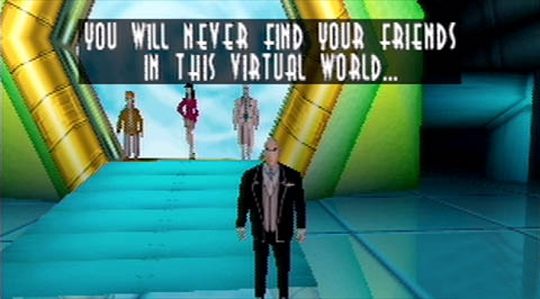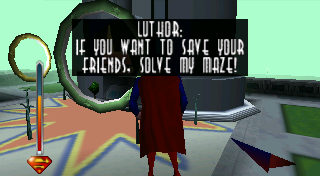Superman 64 review
By apathylad 9 Comments
“I teach you the Superman. Man is something that should be overcome.” - Friedrich Nietzsche
Superman 64 is a work of unparalleled genius. Until now, many believed that the bland textures, poor level design, and awful controls made the product one of the worst video games ever created. However, these opinions are all misguided, because Superman 64’s design transcends all of these “flaws” into a cohesive metaphor on the human condition. Ayn Rand’s Atlas Shrugged cannot be understood by just reading the first one-hundred pages, and similarly, Superman 64 isn’t a game that can be fully appreciated in just one hour’s worth of playtime.

As soon as you start a new game, Lex Luthor appears and says “You will never find your friends in this virtual world.” When I was a kid, I believed that Lex was speaking to Superman in the opening, but as an adult, the message becomes clearer. Lex Luthor is actually telling you, the gamer, that you are alone, and despite the cries of desperation and pleas for mercy, your friends cannot help you in this virtual environment. No one can. It is only you who must overcome this task. You may have doubts about Luthor’s comment reaching a metaphysical level, but it becomes clearer when you see that Superman is not present in this cutscene. Also, Luthor never calls Superman by name in this introduction. Instead, he follows the comment by saying, “If you want to save your friends, solve my maze!” Luthor is challenging your patience, perseverance, and commitment to your friends. But unfortunately, very few people will have such dedication.

You see, Luthor is a bit of a omniscient figure in this game. You, as the gamer will struggle with the finicky controls and repetitive objectives, and if you were to give up, it demonstrates that you are not up to the task of becoming a Superman. Now, Luthor wants you to fly through a series of rings that he has dubbed as a “maze”. The “maze” is obviously an allusion to the labyrinth that Theseus had to overcome in Greek mythology. This reference is as intentional as it is symbolic – because at a glance no one will ever call the series of rings you fly through to be a literal maze. But what does this repetitive action represent? The monotony of the tasks one performs in everyday life. We go to school or work, and are assigned tasks that follow a strict set of rules. Whether it’s solving a math problem or processing transactions on a cash register, these actions become mechanical and uneventful. Just like that, Superman’s obstacle course follows that same set of principles. The poor controls in the game mirror the poor control that we have in our lives. Sometimes, unexpected events occur that become problematic and change our way of thinking, and like so, missing one of the rings in Superman 64 causes us to cut corners, or turn back and correct our mistakes. The kryptonite fog wasn’t an attempt to hide the Nintendo 64’s limited power, but a metaphor for how we cannot look into the future, adding to the hopelessness that is found in Lex Luthor’s test. It is not an easy task we must overcome, after all.
Luthor’s maze sets the tone of the difficult trials that await Superman, or rather, the trials you must go through to become a hero and save your friends. To make a friendship last, you need patience and dedication. It will help you endure whatever conflict you might have with a friend, and Superman 64 teaches you the skills in being more resilient towards conflict. We may fail an attempt at completing a level, and so we usually persevere and try again. When we get into an argument with a friend, we usually try to forgive and forget whatever the disagreement was, and not just “ragequit” our relationship. And in remaining dedicated, we manage to “save” our friends from becoming enemies.
No other game has explored the components of human psychology to the extent of Titus' magnum opus. The subtlety of the narrative is further proof that there will never be another game of this quality in a long time. It starts with a "game within a game" scenario, and because of it, Superman 64 plays with us just as much as we play with the game, if not more so. Very few people who touched Superman 64 have seen it through it to its completion, after all. If there were ever a title that would change Roger Ebert's stance on whether video games could be art, it would be Superman 64.
